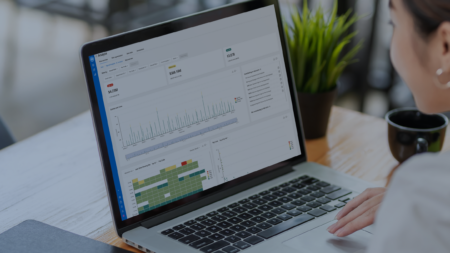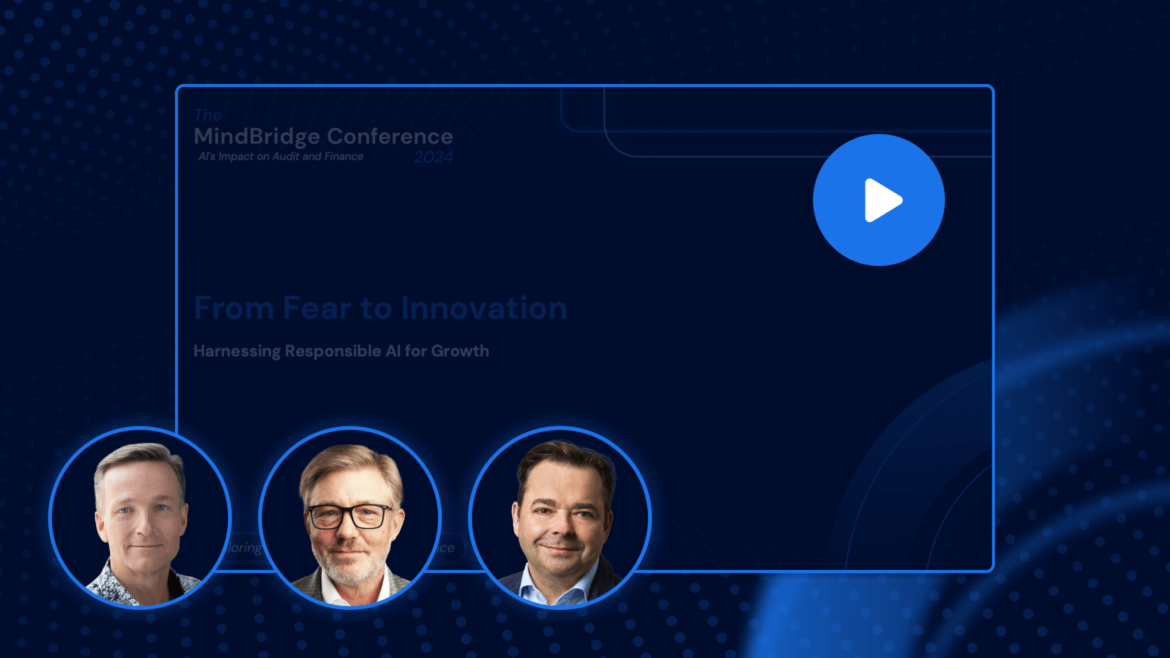In a world where the rapid advancement of artificial intelligence (AI) is reshaping industries, the stakes have never been higher. As MindBridge CEO Stephen DeWitt expressed at the opening of The MindBridge Conference 2024, “The impact of AI on Finance and Audit will be complete. The way it’s done, the capabilities that will be rendered as a result of AI are extraordinary.” With nearly 1,000 finance and audit professionals attending from across the globe, the event signaled the dawn of a new era for financial governance, driven by AI’s potential to transform everything from risk management to operational efficiency.
This conference, particularly the session From Fear to Innovation: Harnessing Responsible AI for Growth, featuring John Weigelt, National Technology Officer at Microsoft Canada, and Robin Grosset, CTO of MindBridge, underscored a central theme: AI is no longer a distant horizon—it’s here, now. And for finance professionals—whether you are a CFO, controller, or auditor—AI is an imperative tool, revolutionizing the way you manage financial oversight.
The accelerating impact of AI on financial governance and auditing
Robin Grosset opened the session by drawing comparisons between AI and previous industrial revolutions. While the mechanization of agriculture or the advent of electricity took decades to realize their full potential, AI’s growth has been exponentially faster. Grosset highlighted the launch of ChatGPT in November 2022 as a watershed moment, noting that in less than two years, AI has changed how businesses operate globally. The technology’s rapid adoption reflects not only its utility but also the necessity for organizations to quickly adapt or risk being left behind.
For financial professionals, this is not just an efficiency play—it’s a strategic imperative. The financial sector, long seen as slow to change, is now at a crossroads where adopting AI can either enhance your organization’s agility or expose its vulnerabilities in a fast-moving market.
Responsible AI in auditing: leading systemic change across financial oversight
AI has been around for years, but as John Weigelt pointed out, it’s the recent democratization of these tools that has made AI truly accessible. Weigelt emphasized that AI isn’t just about point solutions, like fraud detection or anti-money laundering. The real excitement lies in systemic change—how AI can redefine entire supply chains, revolutionize business models, and ultimately create a future where finance professionals can focus on higher-value tasks that require human ingenuity.
For external auditors, CFOs, and controllers, this systemic change means shifting from a traditional mindset of bolting AI onto existing processes, to instead rethinking how AI can fundamentally reshape workflows and decision-making. This is the difference between AI as an efficiency gain versus AI as a game changer.
Why financial organizations need an AI strategy now
Both speakers were clear: the financial professionals and organizations that succeed with AI will be those that actively rethink their business models to integrate AI fully. Grosset referenced the work of Avi Goldfarb, whose insights suggest that organizations must not only adopt AI but embrace it as a transformative element woven into their very mission.
For example, auditors who leverage AI for enhanced anomaly detection and predictive analytics are already seeing AI’s game-changing potential. Rather than simply automating tasks, AI empowers auditors to focus on identifying deep insights, enabling proactive risk management and more strategic advisement to clients. Financial professionals must ask themselves: How can AI help us rethink and enhance our role?
Avoiding AI pitfalls: strengthening AI governance for financial leaders
With the power of AI comes significant responsibility. Both Weigelt and Grosset stressed the importance of understanding AI’s limitations. One common pitfall organizations face is assigning human-like attributes to AI, expecting it to operate autonomously without critical oversight. AI is a tool—it excels at processing large volumes of data and identifying patterns, but it still requires human oversight, especially in areas where judgment and contextual understanding are key.
In the financial world, the stakes are high, and errors can lead to financial and reputational damage. Weigelt shared examples of how improper AI use has led to fabricated case law or incomplete performance evaluations. Both speakers advocated for strong AI governance frameworks, such as those outlined in the NIST AI Risk Management Framework and the ISO 42001 AI Management Standard, to ensure AI is deployed responsibly.
How CFOs and auditors can build an AI-driven culture
Adopting AI isn’t just about implementing technology—it’s about building an AI-friendly culture. Grosset and Weigelt advised financial professionals to begin integrating AI in small, practical ways to familiarize teams with the technology. For instance, using AI-driven tools like Microsoft’s Copilot for tasks such as email prioritization or performance reviews allows teams to start building the “AI muscle” needed to support larger transformations.
Weigelt highlighted that AI’s greatest potential lies not just in automating existing processes but in unlocking new possibilities by fostering human creativity. By partnering with AI, financial professionals can move beyond manual tasks and embrace roles that require strategic thinking, critical analysis, and innovation.
The future of AI in finance: building trust, transparency, and security
As organizations adopt AI, trust and security are paramount. Financial professionals need to know their data is safe and that AI outputs are reliable. Weigelt pointed out Microsoft’s commitment to responsible AI, which includes ensuring data privacy, managing model transparency, and preventing the risks of “black box” decision-making.
Grounding AI outputs in factual data, along with providing transparency on how decisions are made, will be critical to overcoming trust barriers. AI’s future in finance hinges on balancing innovation with the governance frameworks that ensure ethical, secure, and transparent AI adoption.
AI in finance is no longer optional
As our CEO noted in his closing remarks, “Everything is at stake—questions of trust, complexity, cost, and return on investment. We understand the nature of these challenges, and that’s why we built the MindBridge platform to address them head-on.” This sentiment perfectly encapsulates the takeaway from the session: AI is not just an optional tool for financial organizations; it’s a necessary driver of success in today’s fast-paced, complex environment.
Now is the time to embrace AI as a competitive edge. “The future of the enterprise is all about Intelligent Automation,” our CEO stated, reminding us of the urgency to evolve.
Watch the full session on-demand to gain deeper insights from John Weigelt and Robin Grosset on how AI can transform your organization. If you’re ready to explore how MindBridge’s AI solutions can help you navigate this AI revolution, contact a MindBridge expert to discuss your organization’s unique needs.



